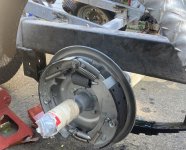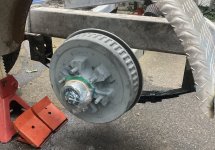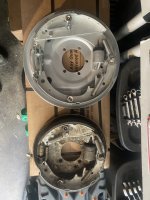I know they are not common but I did see a set of galvanized backing plates for electric brakes, also if you look for them you can get zinc coated brake drums. These would last much longer than plain painted brake assemblies. Here's some tips from maintaining drum brakes in salt water....
1) with a new backing plate, extend the adjuster star wheel by clicking it so it exposes most of the threads, then coat those threads with a thick water proof grease like OMC/Evinrude triple guard grease. Most often the headache with adjustable drum brakes is that the adjuster seizes due to corrosion.
2) pick up a drum brake adjusting gauge, this will allow you to set the shoe adjustment to the actual diameter of the drum, which makes it easier to get the adjustment correct
3) this doesn't apply to electric brakes but it does to hydraulic brakes, you can remove the wheel cylinder, then pack the area under the dust boot with synthetic brake caliper grease. This will keep water out of the brake piston area and give them a longer life before they start to seize up.
The ones on my trailer now have these hard to find bootless wheel cylinders, they seem to last the longest because they don't hold water. These have been on about 4 seasons and are working well. The more common style of wheel cylinder with the boot, will work properly longer if you use the grease to keep the water out. When I upgraded the trailer from a 2x2 3500 lb axle to a 6000 lb 2x3 drop axle I also upgraded the brakes from 10" drums to 12" drums. The 12" brakes are rated to stop 6,000 lbs.

12" brake with bootless wheel cylinder (uses an O ring inside)

zinc coated 12" brake drum

size comparison 10" brake vs 12" brake























